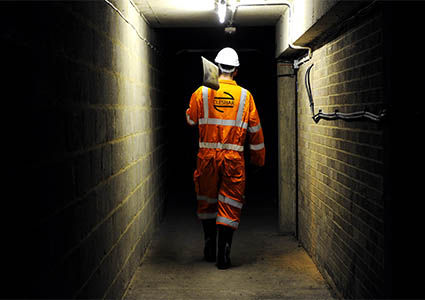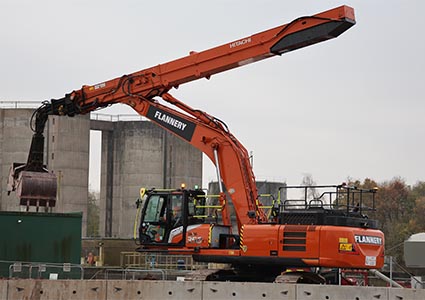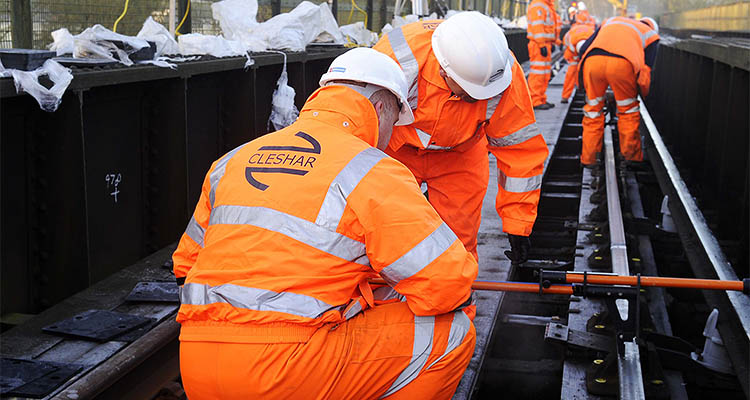Powering the UK’s rail infrastructure, Cleshar is expanding its footprint with investment and innovation
Cleshar Contract Services (Cleshar) is a leading supplier of multidisciplinary services across the UK’s rail infrastructure, providing engineering services to clients either as standalone offerings or as part of a fully integrated, end-to-end solution. As rail infrastructure continues to grow in the UK, Cleshar strives to provide uninterrupted, safe, and high-quality services to its customers, including prestigious organisations like Transport for London (TfL) and Network Rail.
Cleshar began its journey in 1992, focusing on delivering minor track maintenance activities on the London Underground (LU). The company soon identified a significant skills gap for track workers, and in 1995, set up an internal training department to develop and train staff. This aided Cleshar’s reputation, and the company grew to offer a range of multidisciplinary services.
To learn more about the company’s evolution and its latest developments, we sit down with Michael McCarthy, Director of Infrastructure Services, and Andy Redican and Michael Hesnan, joint Managing Directors. 
“As the business expanded, we started to take on larger contracts, and we became incorporated within the CCS Group Plc in 2000, along with Infrastructure Training Services (ITS),” begins Michael H. “We won a monumental, five-year contract in 2009 to supply all the track maintenance operatives across all lines on LU, which rapidly accelerated our growth. The contract included the provision of track welding and to facilitate this part, we recognized the importance of having welding skills as part of the company to provide efficient service.
“We then purchased GPX Engineering (GPX), a specialist track welding company, to complement our track maintenance and renewal teams. GPX is now one of the largest track welding and grinding companies in the UK, with over 80 teams of welders working across the entire national rail infrastructure. This acquisition has been a fantastic addition to the business and enabled us to provide our clients with better value and increased efficiency. With our own training schemes, one of the key differentials on ensuring the success of this acquisition was our ability to train and develop people internally.
“Over the years, we’ve continued to build our capabilities in terms of civil engineering,” he continues. “We’ve worked on several projects like embankment stabilisation works, signal control rooms, and train crew accommodation buildings for LU and NWR, including depot sidings and depot shed extensions.
‘Can do, will do’
In 2018 we were awarded the Infrastructure Maintenance Contract of the East London line for London Overground, which demonstrated a culmination of our diverse range of engineering skills. Maintaining this infrastructure requires the integration of engineering disciplines covering signals, communications, M&E including HV, civils and structures and rail engineering. This contract has been a significant step change for the company.
Andy agrees: “We have a very diverse rail infrastructure offering, which we split into divisions. Our largest area is track maintenance and renewals for both TfL and Network Rail’s infrastructure, which are two of our key clients, for which we also provide safety critical resource provisions. One of our biggest growing services is vegetation maintenance, and we’re now delivering projects up to the value of £15 million, including a full vegetation and fencing contract with TfL. Recently, we won the Design and Build contract to build a new wheel lathe facility at the Cockfosters depot as part of the new Piccadilly Line upgrade scheme, something we are very pleased to be involved with.
“We also have minor building works and track and tunnel cleaning divisions, as well as depot infrastructure maintenance service, which incorporates complete asset maintenance and 24/7 fault maintenance activities. Investing in our people is incredibly important to us, hence why we have our own academy and we’re big supporters of career mentoring and training from within. Given that we operate in a highly regulated environment, safety is at the core of everything we do, and having control of how our people are trained in safety, health and environmental impact is a very important part of our delivery model, as is our support for apprenticeship schemes, taking on between 20 to 30 apprentices each year.”
 In 2021, CCS Group became an Employee Ownership Trust (EOT), with a current annual turnover of more than £100 million. “As an EOT, we’re passionate about growing together and investing heavily in our people,” Michael M says. “It helps us to feel united across the business and reinforces our ‘can do, will do’ approach to ensure safety is at the forefront of everything we do and to be open and transparent with our employees, customers, and supply network.”
In 2021, CCS Group became an Employee Ownership Trust (EOT), with a current annual turnover of more than £100 million. “As an EOT, we’re passionate about growing together and investing heavily in our people,” Michael M says. “It helps us to feel united across the business and reinforces our ‘can do, will do’ approach to ensure safety is at the forefront of everything we do and to be open and transparent with our employees, customers, and supply network.”
Strategic platform
Having recently been appointed as one of the key suppliers for Network Rail’s Southern Integrated Delivery (SID) framework, Michael M shares why this is a positive move for Cleshar. “Securing a position on this framework is another key step on our business journey,” he states. “Around five years ago, the board made a strategic decision to further invest in developing our Network Rail division and to broaden the services we offer within LU infrastructure onto the Network Rail infrastructure.
“Securing our place on this framework is a culmination of several years of hard work and dedication by the team to gain a place on this prestigious innovative delivery model. As part of the Southern Renewables Enterprise (SRE), which is a new and innovative division of Network Rail accountable for the network’s Southern region, we’re able to showcase our knowledge and experience in effectively managing the delicate balance of promoting biodiversity while keeping operational trains running. Our involvement with the SID framework will be a strategic platform to build our portfolio and deliver further works for Network Rail.”
Cleshar has grown significantly in recent years, which has ignited a series of investments. “We’ve recently invested in a new, three-acre operations depot facility very close to Heathrow Airport, which will become our main operational hub for UK operations,” Michael M reveals. “The depot encompasses our fleet, a permanent way track and welding training facility, plant and stores for machinery, and equipment, consumables, testing, and calibration services. There’s very limited storage within the rail environment, so many of our clients rely on us to securely store their equipment.
“The depot is a significant investment for the group as it not only allows us to further develop our operations and training department, but also demonstrates to our clients that we are committed to continuous improvement and reinvestment. In terms of our geographical reach, we have depots in Rotherham, Newport, and a couple in Kent, but we’re slowly trying to dot ourselves around the UK so we can service the entire country.”
Growth trajectory
Another key area of strategic investment is in carbon reduction and sustainability initiatives. “We’re currently investing in the carbon reduction of our fleet in two main ways: electrification and HVO fuel,” Michael H explains. “We’re purchasing electric vehicles (EVs) and installing charging points at our depots and offices as part of our strategy to be carbon neutral by 2032.
“Also, as we deploy around 1400 personnel of various skills and competencies on a daily basis, we’re investing in modernising our bespoke integrated Resource Management Portal, which includes our competence management, fatigue management, and time sheet management. We’ve also moved around 85 percent of our handheld electrical plant to battery power, including the use of solar power to recharge the battery plant.”
Michael M adds: “We’ve also invested in our ITS business to create a dedicated, state-of-the-art training centre called Mercury House. We now have 15 classrooms and our own test track, which enables people to train as if on the job. We’ve even got a tunnel simulator to recreate the underground environment of the LU, helping the trainee to experience live railway and underground sites.”
As our conversation draws to a close, Andy reflects on the company’s growth and how it plans to continue this trajectory. “Over the last five years, we’ve grown consistently at a rate of between five and ten per cent, which is purely organic growth as a result of winning new work and contracts,” he concludes. “We’ll continue to grow and we’re particularly keen to strengthen our presence in the Northern region with the new depots and contracts we’ve established in the area. We’ll retain our focus in the Southern regions as we continuously open new avenues in the Northern rail regions, as this will allow us to grow steadily while maintaining our quality and resiliency.”
